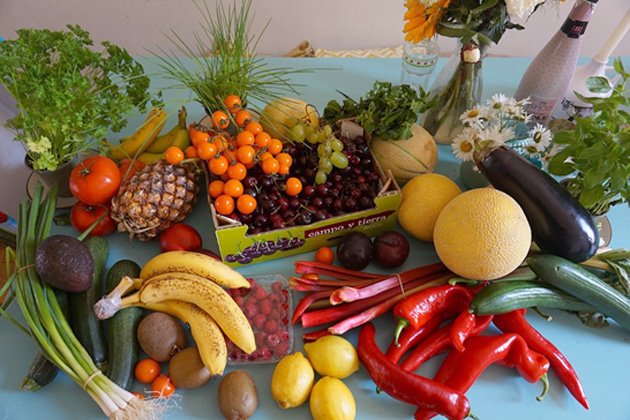Greetings friends @steemit, antioxidants can be found in many foods. Each has its own meaning and ability to synergize with others to help the body work efficiently. Antioxidants are substances that prevent or delay cell damage caused by free radicals.
Free radicals or oxidizers are defective molecules that lack several electrons. They appear in the body due to poor diet and a reaction to the environment, for example, as a result of air pollution, poor diet, inflammation, UV radiation, smoking.
If the body cannot process and eliminate free radicals effectively, they begin to react with everything that gets in their way. As a result, "oxidative stress" that negatively affects the body can occur.
Oxidative stress causes: heart disease, emphysema, cancerous tumors; arthritis, respiratory infections; immunodeficiency; blows, Parkinson's disease.
Antioxidants neutralize free radicals and this improves health. Antioxidants act at the intramolecular level. The molecules are formed by two or more related atoms. Atoms, on the other hand, consist of a nucleus with positively charged neutrons and protons, and negatively charged groups of electrons that revolve around the nucleus. The human body is an accumulation of many molecules: proteins, fats, carbohydrates. In other words, an organism is a combination of a large number of atoms that interact with each other.
A molecule that has lost one or more electrons is transformed into a free radical.
The danger of free radicals lies in their instability: having lost an electron, that molecule, by interacting with other molecules, can damage them by stealing the electron. Damaged molecules become free radicals. When they reach a large number, oxidative stress can occur, a state in which cells die and inflammation of organs and tissues occurs, aging accelerates and the immune system breaks down.
When an antioxidant appears, it gives its electron to the free radical, but remains stable. Then the damaged molecule is neutralized, ceasing to be a free radical.
Oxidizers perform useful functions. Immune cells cause free radicals to destroy harmful bacteria. Only a balanced amount of oxidants and antioxidants guarantees the normal functioning of the body.
Types of antioxidants
By the method of delivery to the cells: Exogenous - come from outside. Vitamins A, C, E, beta-carotene, lycopene, lutein, selenium, manganese, zeaxanthin; Endogenous - they are synthesized by the body. Glutathione, melatonin, alpha lipoic acid.
By location of action: soluble in water: acts inside the cells and outside. Vitamin C; fat soluble: they act on cell membranes. Vitamin E.
By origin: Vitamin - vitamins A, C, E; Mineral: selenium, zinc, copper, chromium, manganese; Flavonoids, flavones, catechins, polyphenols and phytoestrogens: plant products are saturated with this large group.
Antioxidants in food.
Food products of plant and animal origin are the main deposits of antioxidants. The superiority in the amount of its content belongs to fruits and vegetables. Fish and meat are inferior in these indicators.
The following compounds in food help the body to saturate with antioxidants:
- Vitamin A: milk, eggs, dairy products and liver;
- Vitamin C: goji berries, cauliflower, oranges and peppers;
- Vitamin E: nuts, seeds, sunflower and other vegetable and green leafy vegetable oils;
- Beta-carotene: fruits and vegetables of juicy colors, such as peas, carrots, spinach and mangoes;
- Lycopene - pink and red pink and red vegetables and fruits: tomatoes and watermelon;
- Lutein: green leafy vegetables, corn, oranges and papaya;
- Selenium: corn, wheat and other whole grains, rice, as well as nuts, eggs, cheese and legumes.
Many antioxidants contain: red grapes; apples, pomegranates, blueberries, spinach, black and green tea; eggplant, broccoli; legumes: black beans, beans, lentils; dark chocolate
Antioxidants cannot be exchanged, since none of them is responsible for the performance of their task. Therefore, it is important to comply with a variety of diets.
Antioxidants in the form of synthetic additives.
Without antioxidants, it is impossible to maintain a healthy state of the body, and the best way to ensure your intake is a complete diet without harmful food addictions.
If it is not possible to balance food, take synthetic sources of antioxidants - nutritional supplements:
- Vitamin - retinol (vitamin A), ascorbic acid (vitamin C), tocopherol (vitamin E);
- Mineral: copper, chromium, selenium, manganese, zinc. They play an important role in the absorption of vitamins and other antioxidants;
- In dosage forms: coenzyme Q10, lipine, glutargine.
The condition for its use is moderate use. Excess antioxidants are toxic and can cause oxidative stress or death.
The main danger in the use of synthetic additives is the inability to control the amount of its intake in the body. This happens, for example, with vitamin C, which is often present in finished foods. It is added as a preservative and the shelf life increases with it. Antioxidants are often used as nutritional supplements, so to avoid an overdose, it is better to obtain them from natural products.

Dear friend, you do not appear to be following @wafrica. Follow @wafrica to get a valuable upvote on your quality post!
Muy buen contenido. Debería existir un proyecto en steemit para información nutrimental.
Saludos cordiales.
Posted using Partiko Android